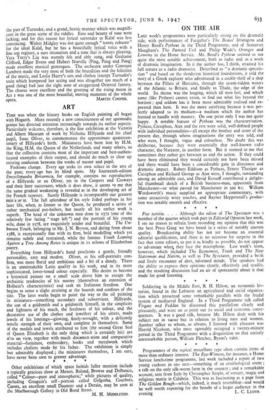ON THE AIR
LAST week's programmes were particularly strong on the dramatic side, with performances of Farquhar's The Beaux' Stratagem and Henry Reed's Pytheas in the Third Programme, and of Somerset Maugham's The Painted Veil and Philip Wade's Oranges and Lemons in the Home Service. Mr. Reed's Pytheas seemed to me quite the most notable achievement, both as radio and as a work of dramatic imagination. In it the author has, I think, attained his full stature as a radio dramatist. Described as "a dramatic specula- tion" and based on the slenderest historical foundations, it told the story of a Greek explorer who adventured in a cockle-shell of a ship between the Pillars of Hercules, through the storm-ridden waters of the Atlantic to Britain, and finally to Thule, the edge of the world. Its theme was the longing, which all men feel, and which some (like Pytheas) cannot resist, to find out what lies beyond the horizon ; and seldom has it been more admirably realised and ex- pressed than here. It was the more satisfying because it was per- fectly adapted to its Medium—a medium which the author has learned to handle with mastery. On one point only I was not quite happy. A notable feature of Pytheas was the characterisation. Pytheas, Ctesiphon, Ajax and the rest were solid, well-defined people with individual personalities—all except the brother and sister of the present day, through whose imaginations the story was told, and who were, I thought, vague and colourless. No doubt this was deliberate, because they were essentially that well-known radio character, the Narrator, in another form. But it seemed to me that sometimes they rather got between us and the action. If they could have been eliminated they would certainly not have been missed and there would have been a considerable gain in directness and dramatic impact. Robert Eddison as Pytheas, Ernest Thesiger as Ctesiphon and Richard George as Ajax were, I thought, outstanding among an admirable cast, and David Kossoff contributed a delight- ful thumbnail sketch of a British business-man, apparently from Manchester—or what passed for Manchester in soo B.C. William Wordsworth's music supplied an appropriate commentary, with some attractively witty touches, and Rayner Heppenstall's produc- tion was notably smooth and effective.
* * Fiat justiria. . . . Although the editor of The Spectator was a member of the quartet which took part in Editorial Opinion last week, I see no reason to refrain from recording my opinion that this was the best Press Gang we have heard in a series of notably uneven quality. Broadcasting ability has not yet become an essential editorial qualification, and there is no occasion for surprise in the fact that some editors, to put it as kindly as possible, do not appear to advantage wherl they face the microphone. Last week's team, however, which included The Economist, Truth and The New Statesman and Nation, as well as The Sc;ectator, provided a brisk and lively encounter of alert, informed minds. The speakers had the ability to express their opinions clearly, effectively and readily, and the resulting discussion had an air of spontaneity about it that made for good listening.
* * Soldiering in the Middle East, R. H. Hilton, an economic his- torian, found in the Lebanon an agricultural and social organisa- tion which presented some remarkable parallels with the feudal system of mediaeval England. In a Third Programme talk called Virgate and Feddan he discussed this parallelism clearly and pleasantly, and went on io point out its social and economic conse- quences. It was a good talk, because Mr. Hilton dealt with his subject not in vacuo but in relation' to living men and women. Another talker to whom, as always, I listened with pleasure was Harold Nicolson, who most agreeably occupied a twenty-minute period in the Third Programme with a disquisition on that entirely unremarkable person, William Fletcher, Byron's valet.
* *
Programmes of the topical miscellany type often contain items of more than ordinary interest. The Eye-Witness, for instance, a Home Service lunch-time programme, last week included a report of two young cuckoos in one nest—something of an ornithological event ; a talk on the only silk-worm farm in the country ; and a remarkable account, sent from Italy by Christopher Serple, of sorcery, magic and religious mania in Calabria. This was as fascinating as a page from The Golden Bough—which, indeed, it much resembled—and would be well worth repeating for the benefit of a larger audience in the


































 Previous page
Previous page